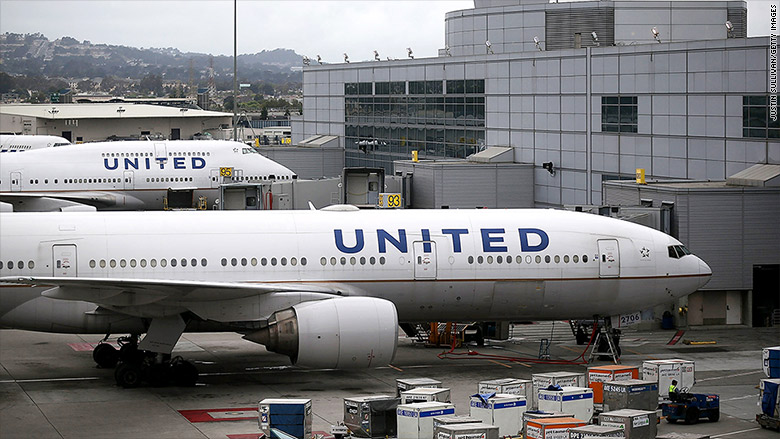
Two hedge funds are tired of the problems plaguing airline United Continental. So they are hoping to elect their own board members --- and they've enlisted the help of former Continental CEO Gordon Bethune.
PAR Capital Management and Alitmeter Capital Management, which collectively own a 7.1% stake in United (UAL), said Tuesday they are encouraging shareholders to vote for Bethune and five other board nominees at the company's next shareholder meeting.
"As long-term United stockholders, we have been greatly disappointed with United's poor performance and bad decisions over the last several years," said Brad Gerstner, founder and CEO of Altimeter, in a press release
Gerstner, a former board member at travel site Orbitz (now owned by Expedia (EXPE)), is also one of the nominees for United's board.
This power play comes one day after United appointed three new independent directors to its board, increasing the size of the board to 15.
But Gerstner was not happy with this move. He called it a "last-ditch effort" and "a cynical attempt to preserve power" by the board.
Related: United buying 40 new 737-700s to upgrade fleet
In a letter to Meyer and the rest of United's board, Gerstner and PAR CEO Paul Reeder said a change was "urgently required" due to the "many years of substantial and inexcusable company underperformance" compared to other airlines.
United said in a statement that it was "deeply disappointed" by what it deemed a "hostile action."
Chairman Henry Meyer said it had "repeatedly communicated" its willingness to work with Altimeter and PAR Capital. He added that the shareholder proxy fight "could distract" United from executing new CEO Oscar Munoz's turnaround plan.
It has been a turbulent couple of years for United -- despite a huge drop in jet fuel costs and a resurgence in demand for both business and leisure travel.
Sign up for the Quest Means Business newsletter
Although the stock has more than doubled in the past five years and has done extremely well compared to the broader market, it is the worst performer among major airlines over the past five years.
United has lagged Delta (DAL), American (AAL), Southwest (LUV), JetBlue (JBLU) and Alaska Air (ALK) by a fairly wide margin. Shares of United fell 3% in late morning trading Tuesday.
The company has struggled in the wake of its merger with Continental in 2010. United has routinely finished near the bottom of several consumer satisfaction surveys.
Related: United CEO set to return to work after heart transplant
Last September, CEO Jeff Smisek was forced out in the wake of a corruption probe. The airline was accused of trying to curry favor with the Port Authority of New York and New Jersey.
Munoz, formerly the president of railroad CSX (CSX), was hired to replace Smisek. But he was only on the job for a couple of weeks before he suffered a heart attack.
He subsequently received a heart transplant and is set to return to his job full time later this month.
Munoz said in response to Altimeter and PAR Capital that United will continue to focus on improving its customer service as well as employee relations.
He added that United's financial performance has gotten better, although he conceded that there is still a gap between how profitable it is compared to other airlines.
Related: Chuck Schumer wants airlines to stop shrinking seat sizes
It was unclear whether Altimeter and PAR Capital have any major beef with Munoz though.
Their letter did not mention Munoz or any other United executives by name. It appears that the hedge funds' main gripe is with Meyer and other non-executive board members.
And Sara Nelson, the president of the Association of Flight Attendants trade union, issued strong words of support for Munoz, saying that he was actively involved in trying to repair labor relations even while he was on sick leave.
"Our union has worked with a lot of management teams over seven decades and we have rarely experienced a CEO as engaged or committed to the success of an airline," Nelson said.
Still, it's noteworthy that Altimeter and PAR have the former CEO of Continental, the company United merged with, on its side.
If the hedge funds are able to elect their slate of board nominees, you'd think they would want Bethune -- who led Continental from 1994 through 2004 -- to play a more active role in how United is run.
Along those lines, one analyst welcomed the news, arguing that United needed a nudge from activists.
"Whatever happens, [United] is well served to be pushed to improve performance. While Mr. Bethune could be a disruptive force, he is a seasoned executive with great skill," said Jim Corridore, an analyst at S&P Global Market Intelligence.


